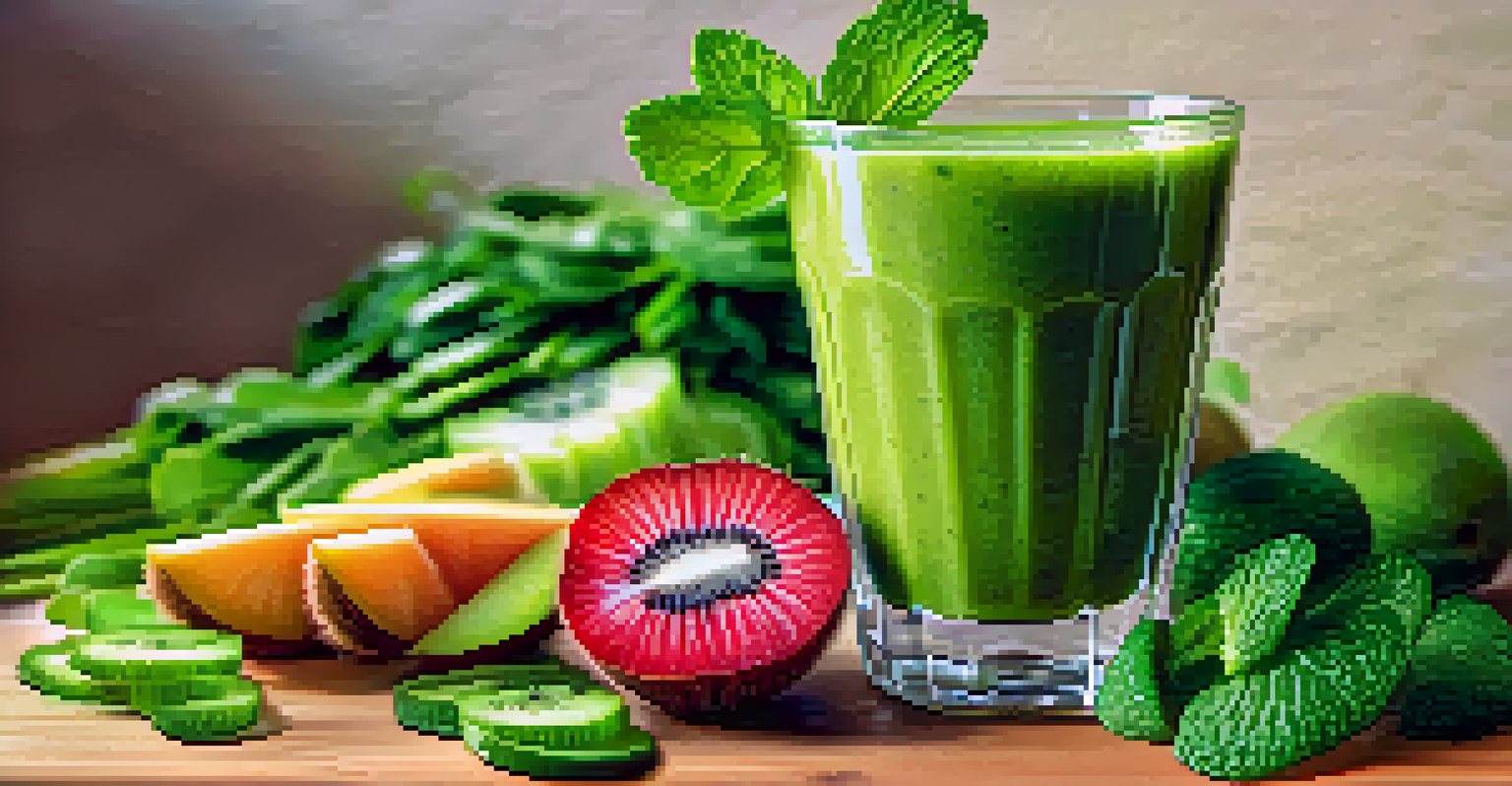Are Raw Foods Really Beneficial for Your Immune System?

Understanding Raw Foods and Their Nutritional Value
Raw foods consist mainly of fruits, vegetables, nuts, and seeds that are unprocessed and uncooked. This approach is rooted in the belief that cooking can destroy essential nutrients and enzymes, which play crucial roles in digestion and immunity. By consuming these foods in their natural state, proponents argue that we can maximize their nutritional benefits and promote better health.
Let food be thy medicine and medicine be thy food.
One of the most significant advantages of raw foods is their high vitamin and mineral content. For instance, leafy greens and vibrant fruits are packed with antioxidants, which help combat oxidative stress in our bodies. This stress, when left unchecked, can weaken the immune system and make us more susceptible to illness.
Additionally, raw foods are often rich in dietary fiber, which supports gut health. A well-functioning gut is essential for a strong immune response, as a large portion of our immune system is housed in the digestive tract. Hence, incorporating raw foods into your diet may be a strategic move to enhance overall immune function.
The Role of Antioxidants in Immune Support
Antioxidants are compounds that help neutralize free radicals in the body, which can cause cellular damage. Raw fruits and vegetables are abundant in these powerful substances, particularly vitamins C and E, which are known for their immune-boosting properties. By consuming a variety of colorful produce, you can ensure a high intake of these essential nutrients.

For example, berries, citrus fruits, and bell peppers are excellent sources of antioxidants. Including these foods in your diet can help reduce inflammation and oxidative stress, two factors that can compromise immune function. This means that a raw food diet may not only provide essential nutrients but also actively work to enhance your body's defenses.
Raw Foods Boost Immunity
Consuming raw foods rich in vitamins, minerals, and antioxidants can enhance immune function and promote overall health.
Moreover, the synergistic effect of various antioxidants found in raw foods can lead to a more robust immune response. By focusing on a diverse array of raw items, you can harness the full spectrum of health benefits they have to offer, ensuring your body is well-equipped to fend off pathogens.
The Importance of Enzymes in Raw Foods
Enzymes are biological catalysts that facilitate chemical reactions in our bodies, playing a vital role in digestion and nutrient absorption. Raw foods are rich in these enzymes, which can help break down food more efficiently and enhance nutrient availability. Cooking often destroys many of these natural enzymes, leading to decreased digestibility.
The food you eat can either be the safest and most powerful form of medicine or the slowest form of poison.
When you consume raw foods, you're providing your body with these necessary enzymes, which can support gut health and overall digestion. A healthy digestive system is crucial for a strong immune response, as it allows for effective nutrient absorption and waste elimination. This connection further emphasizes the role of raw foods in promoting immune health.
Incorporating raw foods into your meals can also encourage mindful eating habits. When you take the time to prepare and enjoy fresh produce, you may become more attuned to your body's needs, leading to healthier choices and better overall wellness.
Raw Foods and Their Impact on Gut Health
The gut microbiome, a complex community of microorganisms residing in our intestines, plays a significant role in our immune system. A diverse and balanced microbiome strengthens immune function and protects against infections. Raw foods can contribute positively to gut health by providing prebiotics, which are non-digestible fibers that feed beneficial gut bacteria.
Foods such as garlic, onions, and leeks are excellent sources of prebiotics when consumed raw. By nourishing your gut flora, you're not only supporting digestion but also enhancing your immune response. This symbiotic relationship underscores the importance of a varied diet, including raw foods, for optimal health.
Enzymes Aid Digestion
Raw foods provide natural enzymes that improve digestion and nutrient absorption, supporting gut health and immunity.
Moreover, a healthy gut microbiome can help reduce inflammation throughout the body, further supporting immune function. This illustrates how embracing raw foods can have a cascading effect on your overall wellness, promoting both gut and immune health.
Potential Risks of a Raw Food Diet
While raw foods offer numerous health benefits, it's essential to acknowledge potential risks associated with a raw food diet. One significant concern is the possibility of foodborne illness due to the consumption of unwashed or improperly handled raw produce. Thorough washing and proper food safety practices are crucial to mitigate this risk.
Additionally, some people may find it challenging to meet their nutrient needs solely through raw foods. For instance, certain nutrients, like vitamin B12, are primarily found in animal products, which are not a part of a raw vegan diet. This can lead to deficiencies if not carefully managed through supplementation or alternative sources.
Lastly, a raw food diet may not be suitable for everyone, particularly those with specific health conditions or digestive issues. It's always a good idea to consult with a healthcare professional before making significant dietary changes, ensuring that your choices support your unique health needs.
Balancing Raw and Cooked Foods for Optimal Health
Instead of strictly adhering to a raw food diet, consider finding a balance between raw and cooked foods. Cooking can enhance the availability of certain nutrients, such as lycopene in tomatoes and beta-carotene in carrots, making them more beneficial when consumed cooked. This approach allows you to enjoy the best of both worlds, maximizing nutrient intake.
By incorporating a variety of both raw and cooked foods into your meals, you can ensure a comprehensive nutrient profile. This balance can help you reap the immune-boosting benefits of raw foods while also taking advantage of the enhanced nutrient absorption that cooking can provide.
Balance Raw and Cooked Foods
Combining raw and cooked foods in your diet maximizes nutrient intake and enhances overall wellness.
Moreover, this flexible approach can make meal planning more enjoyable and sustainable. You can experiment with different recipes and cooking methods, ensuring your diet remains diverse and exciting, ultimately supporting your long-term health goals.
How to Incorporate More Raw Foods into Your Diet
If you're interested in reaping the benefits of raw foods, start by slowly incorporating them into your meals. Begin with simple changes, such as adding a side salad of fresh greens or snacking on raw vegetables instead of chips. This gradual approach can make the transition smoother and more enjoyable.
Experimenting with raw recipes can also be a fun way to explore new flavors and textures. Smoothies, raw wraps, and energy balls are delicious options that can easily fit into your routine. By getting creative, you'll find that raw foods can be both nutritious and satisfying.

Lastly, consider joining a local community or online group focused on raw food enthusiasts. Sharing tips, recipes, and experiences can provide motivation and inspiration, making it easier to incorporate more raw foods into your everyday life while enhancing your immune system in the process.